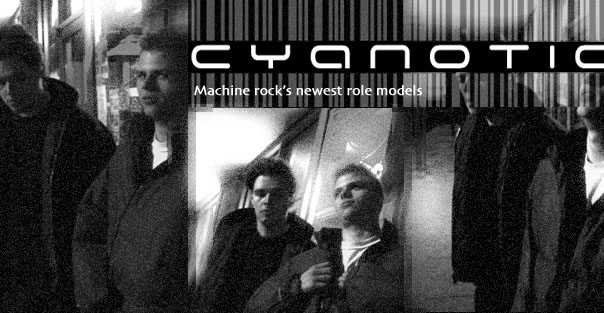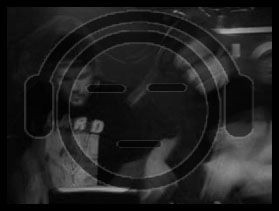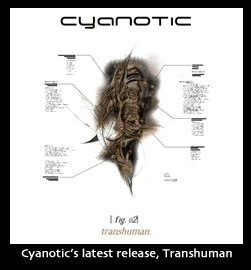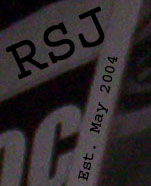|

Picture the current industrial community as the high school cafeteria. You've got your futurepop kids on one side of the
room, while the machine rock crew shoots them dirty looks on the other. Someone at the powernoize table is trying to make
the point that all of their stuff most certainly does not sound the same, but the cyber kids are too busy trying not to spill
anything on their new Matrix coats to notice. And the Neubauten table is still insisting that they should really be the ONLY
table in the room.
And then you've got Cyanotic's Sean Payne -- the new kid who just wants to know why everybody can't sit together and make
fun of nu-metal. Having just released his band's first full length, Transhuman, Payne has made an album that reaches across
the sub-genres to become something that one might call...well...industrial. Rock Star Journalism speaks with Cyanotic's founder
about finding his place in the cafeteria.
Rock Star Journalism: Tell us about the creation of Transhuman. How did the creative process work between you and Drew [Rosander]?
Sean Payne: Basically, I started with all the rhythm patterns and he came in and added some synths and guitars. Then
somewhere in between all that we got another member to the band whose name is Brian Blake. He's always been around, but he
came into the creative process about three months before we were done with the masters. He played all the bass on the record
and added a couple programming nuances to the overall mix.
RSJ: How do you think this album differs from the work on your EP, Mutual Bonding Through Violation?
SP: We figured out that we were using way too many layers on the EP, so stuff was sounding too muddled. Some of the tracks
on the EP had like 80 sounds going on at once; we realized it was overkill. That's why with Transhuman we set ourselves to
no more than 50 sounds in one song. And the production -- we tried to make it as clear and crisp as possible. That's why
we brought in the guys from the Acumen Nation/DJ? Acucrack camp. That was really cool cause I've been listening to Acumen
Nation since I got into this music about 8-9 years ago.
RSJ: Jason [Novak] was the producer on Transhuman, correct?
SP: I gave him a producer credit cause he did tweak a lot of the sounds. We did all the mixing together; he did the mastering
for the disc and added a few of his own little touches. You can hear it especially in songs like "Beta Blocker"
but he didn't actually contribute any programming. Which is kind of funny, because a lot of people who've heard this so far
have said, "oh yeah, I can hear the Acumen in your music." He didn't actually do any of the programming; we were
just influenced by his stuff quite a bit.
RSJ: How did you first get involved with the Cracknation group?
SP: I was like their ultra fanboy. I'm like two hours from Chicago, so I used to always make it out to all their shows.
They were one of the first bands that melded what I really wanted to do. They had a danceable sensibility, especially in
their earlier stuff, but, they still had a lot of guitar work, and that was what always drew me to these guys' shows. And
they were always some of the most hospitable people. After awhile they just kind of grew to know me. So by the time the
Mutual Bonding cd came out, I gave a copy to all the guys and Jason had some real kind words to say about it. When it came
around to doing [Transhuman], I got in touch with Jason and asked if he would want to help mix these songs. It was one of
the biggest honors to have those guys helping me out.
He got our cd to a couple of people who really mattered -- FJ [DeSanto] from The Aggression was one of them. He's hooked
us up -- we're gonna do a remix for his Aggression remix cd that's gonna be coming out on Digital Brothel. And then we're
also going to be finishing up this Chemlab remix for that record pretty soon. Chemlab's another one of those bands I've been
listening to for like 10 years. So, to have a direct connection and be able to remix these people's music that I've liked
for so long -- I'm pretty happy.
RSJ: I did see that you were planning to contribute to the Chemlab covers cd that's being talked about on the Hydrogen
Board. What's happening with that?
SP: I don't really know. And I don't wanna shit talk, but I've been involved in other fan tributes -- actually the first
Cyanotic song I ever did was a cover of "Two Wires Thin" by 16 Volt -- and it was for a fan tribute that never came
together. I was the only person, besides two other artists, who finished the cover out of 14. So, I don't know if my hopes
are too high for this Chemlab thing. I'd really like to be able to finish up the contribution, but we've been so busy trying
to promote our album, and now we're working on doing a tour in the mid-summer. And we have a totally new line-up -- we have
a live drummer for once and we have a new keyboardist. So, it's been kinda hard to put time into the Chemlab cover.
 RSJ: You mentioned the tour -- in the past, you've done shows with a wide variety of artists. How did you end up opening
for Andrew WK?
SP: We get bashed for it all the time, but we don't try and lie about what we like. We like Andrew WK! So, we asked
our manager if he could get us a show with him. And then we played it, and it was a really weird response.
RSJ: I can imagine. How did the crowd react to you?
SP: (Laughs) I don't know. I mean, we sold cds that night. There was some positive things said about us. The crowd
reaction, it was...interesting. It was better than the Dillinger Escape Plan.
RSJ: Yeah, I was wondering how the hardcore crowd felt about you.
SP: That show should have went down good, but our former live drummer flaked out on us the day of that show. So, imagine
getting up there -- and it was packed, like 600 people in a 400 capacity venue -- and we didn't have a drummer. The hardcore
kids don't really respond too well to that. We thought we would've been in the clear if we'd had a drummer.
RSJ: See, I would think so too. Especially since lately there's been more of an introduction of electronics into the
hardcore scene.
SP: Right! That's why we thought, hell yeah, we'll play with Dillinger. We were fans of Dillinger Escape Plan, that's
one of the reasons we tried getting that show. On the new Dillinger album, the song "Phone Home" sounds like a
nine inch nails b-side. But we got the weirdest crowd reaction ever at that show. It was this godawful sound -- it wasn't
like booing, it wasn't like cheering -- it was like a mixture of these two hellish sounds.
RSJ: Speaking of some of the difficulties you've had in the past, you dealt with some hard drive crashes creating Transhuman
--
SP: Oh, yeah. Numerous. Originally, we were planning on having Transhuman out by 2004, and now we're looking at almost
summer 2005. We've had three hard drive crashes since then. I've been able to back up some of the stuff, but some of it
I just completely lost. Like everything for the EP was created on a Toshiba laptop, and then one of my friends put the laptop
on top of a magnet. So, that was a huge setback. That probably knocked a good four or five months out of us. We lost another
one right after the Dillinger show, and then we lost another one right after the Cracknation sessions. But I was lucky cause
I backed up the Cracknation stuff.
RSJ: You've developed your own record label -- what originally led to your starting Glitch Mode?
SP: I didn't want to try and conform to a label's standards. If we'd come around in the mid to late '90s, I'm sure the
electronic labels would have been a little more accepting of our sound. But ever since like 1998, the scene has developed
a real anti-guitar sentiment. And that was something I never wanted to take out of our songs, cause no matter how harsh we
can get with synths, I need that chunkiness from the guitar.
But we're gonna start shopping to labels with Transhuman. It seems like a really good time for the scene. It seems like
people may be getting tired of just futurepop or powernoise. I mean, I like powernoise, but I think it's great when people
cross-pollinate the genres. Not enough people are doing that. There's too many people making an album where every song sounds
alike. And that's something we really try to do differently.
 RSJ: Do you have anyone else that will be putting out releases through Glitch Mode?
SP: There's a couple bands we would love to put out. There's a band in Texas by the name of Darque Science, and they're
this awesome hybrid of industrial and drum'n'bass. But the thing is, it all comes down to financial issues. We've basically
got enough to keep Cyanotic going at this point. But I do want to keep up with the compilations; I'm putting out a compilation
for the Dark Sonus people. If we make enough money off Transhuman, we do want to do a Glitch Mode compilation featuring some
of these bands that have sent us demos that deserve a little more exposure. Cause that's what I want to promote. Electronic
music is one of my only real passions.
RSJ: I noticed that you're part of the Third Wave Collective. How did you get involved with them?
SP: I just knew a lot of people in the area who were involved with it already. Third Wave's been really instrumental
in helping with promotion too.
RSJ: It seems like one of the goals of that group is getting people in the industrial community to help each other out.
Do you think the genre would benefit exposure-wise if there was more of a united front?
SP: Oh, yeah. See, that's why I think industrial almost reached its peak. It was almost big for a while in the '90s,
and that's because there was so much unity between the bands. Now there's this elitist attitude that pisses me off. The
people standing in the corner smoking cloves going, "oh my god, is he wearing blue jeans?" I've got no problem
with style, I've got no problem with fashion, but the number one thing that comes with music is music. And people seem to
be putting that in the background and focusing more on the fashion and the elitism and "hey, I know more obscure bands
than you do."
I still read all the message boards, I still keep up with all the releases, but there need to be some changes in the attitude
of fans and artists. It's like everybody has to adhere to one scene: "I only listen to futurepop" or "I only
listen to industrial rock." Why limit yourself? There were no bullshit terms in the '80s and '90s. There was no "I'm
listening to cyber aggro tech." They'd just say it's industrial music. That's what it was.
RSJ: There used to be a lot more under the general heading of "industrial."
SP: You called Ministry industrial. You called Skinny Puppy industrial. You called Throbbing Gristle industrial. And
when people started making up these stupid fucking names for what genre they listen to, that shit got out of hand. There's
so many schools of thought on what's industrial and what's not. I mean, you can say industrial ended in the early '80s when
Industrial Records fell, and then you can call everything afterwards post-industrial. But it's all the same, isn't it? It's
all heavy music made with electronics. That's how I classify industrial. Even Neubauten, it was still sampled. They were
still sampling all their grinding power tools.

RSJ: You mentioned the internet briefly. You seem to have a heavy presence on a lot of message boards. How well has that
worked as a vehicle for promotion for you?
SP: Cyanotic wouldn't be anywhere without the internet. We really don't have any promotion anywhere else. We're in a
few magazines, there's an ad for us coming out in the new IndustrialNation. Other than that, the internet's been our number
one tool. I think even if we get bigger, the internet will always be the number one promotion tool for us. Our forums are
actually really active. I look at all these other bands that are, in contrast, much better known, but they don't have the
kind of active message boards we have. It's those people that keep me alive. And I help promote -- I am the ultimate in
shameless self-whoring.
RSJ: But people have occasionally gone to the wrong website, as there's another band called Cyanotic.
SP: We had an internet presence two and a half years before these guys. We're always number one in the search engines
and everything, so I don't really worry about it too much. The only thing I worry about is the people who want to check us
out and think, "Hey let's go to cyanotic.com." And then they end up ordering the cd and it's fucking nu-metal.
This has happened twice.
RSJ: For those that get to the right website (cyanotic-online.com) -- is Transhuman only going to be available online?
SP: We've actually been talking to a couple different distributors. The best way to get it is gonna be directly through
cyanotic-online or Cracknation. We're an indie band, so we need all the money we can get to fund tours and everything. The
Mutual Bonding EP was distributed in a couple underground indie stores, and we got some really good responses from that.
We just have to see how it pans out, but we're looking to have it in stores. I'm not trying to sound pompous, but I really
think it deserves a decent audience. We just put so much damn work into it.

|

